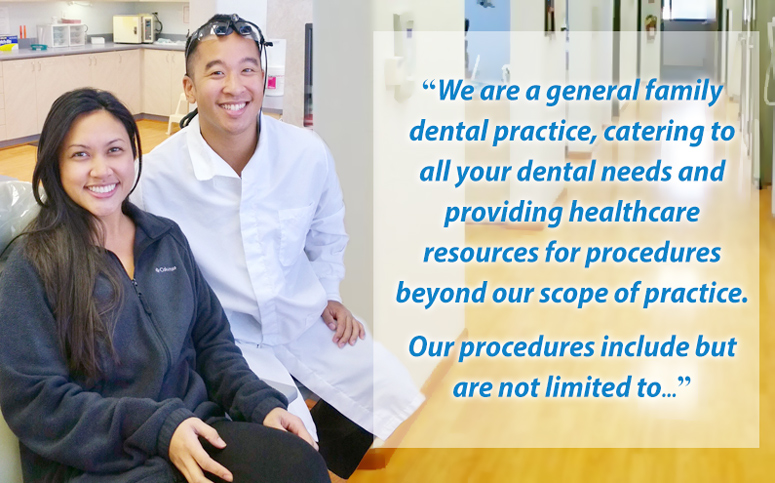


Learn More About Our Procedures
At a glance, here you can learn more about the various dental procedures performed on our patient's teeth, gums, and jaw, as well as other specialized treatments available in our office.
• Comprehensive Exam & Cleaning
• Fillings ⁄ Dental X-ray
• Crowns, Veneers, and Bridges
• Extractions & Root Canal Treatment
• Simple Perio Surgery ⁄ Gum Surgery
➤ TMJ Rehabilitation
• Mouth Guards ⁄ Dentures ⁄ Bleaching Appliances
TMJ Rehabilitation
The TMJ or Temporomandibular (tem-puh-roe-man-DIB-u-lur) Joint acts like a sliding hinge, connecting your jawbone to your skull. You have one joint on each side of your jaw.
Healthy jaws are important for numerous functions (e.g. eating, speaking, etc) so evaluating jaw function is a priority in our exams. Muscle massage techniques and other modes of treatment can be applied according to your needs. Below is some insight and answers to some of our most frequently asked questions.
Do I have TMJ?
Patients who report jaw pain also tend to clench or grind their teeth (bruxism) especially while sleeping; yet, there are also patients who habitually clench or grind their teeth (bruxism), as is evident during a thorough dental examination, but do not develop TMJ disorders.
Pinpointing the exact cause of a person's TMJ disorder can be challenging, but more often that not it is due to a combination of factors, such as bruxism, arthritis, jaw injuries, and even genetics.
The Benefits Outweigh Possible Complications
Simply put, TMJ disorders left unchecked can lead to aching pain in and around your ears, and even make chewing or speaking painful, in which case you must seek medical attention.
Benefits:
Improved range of motion in the jaw. Decreased or eliminated clicking or popping sounds in the jaw joint. Overall decrease in the pain associated with TMJ dysfunction.
Possible Complications:
TMJ disorders can lead to severe pain hindering the muscles and joints that control jaw movement. Persistent jaw pain or tenderness in your jaw can prevent you from being able to open or close your jaw completely.
Why Shouldn't I just Wait Until I'm in Serious Pain?
It Is important to not delay routine dental care because the underlying dental disease can be detected even before pain symptoms develop.
In some cases, the symptoms of TMJ disorders may go away with recommended self-managed care or nonsurgical treatments.
If your TMJ pain symptoms persist, we may recommend a variety of treatment options to relieve the pain associated with TMJ disorders.
Surgery is typically a last resort after conservative measures have failed, but some people with TMJ disorders may also benefit from surgical treatments.
Can I afford to have this type of procedure done?
Our fantastic financing department can help draw up a plan for payment and
Our fantastic financing department can help draw up a plan for payment and Care Credit options are also available to those who qualify.
Ask Dr. Mora
Chime in! Join the conversation and please don't hesitate to Ask Dr. Mora for more insight and answers to your dental questions.



